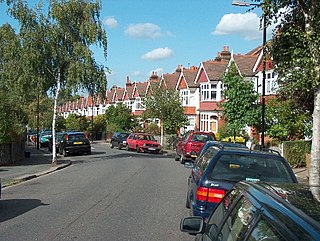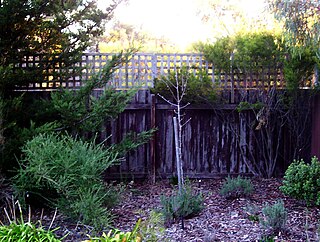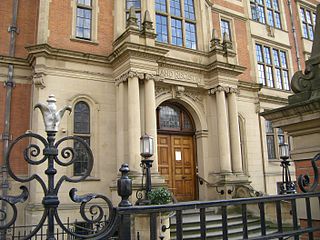Adverse possession, sometimes colloquially described as "squatter's rights", is a legal principle in the Anglo-American common law under which a person who does not have legal title to a piece of property—usually land —may acquire legal ownership based on continuous possession or occupation of the property without the permission (licence) of its legal owner. The possession by a person is not adverse if they are in possession as a tenant or licensee of the legal owner.
A leasehold estate is an ownership of a temporary right to hold land or property in which a lessee or a tenant holds rights of real property by some form of title from a lessor or landlord. Although a tenant does hold rights to real property, a leasehold estate is typically considered personal property.
As a legal term, ground rent specifically refers to regular payments made by a holder of a leasehold property to the freeholder or a superior leaseholder, as required under a lease. In this sense, a ground rent is created when a freehold piece of land is sold on a long lease or leases. The ground rent provides an income for the landowner. In economics, ground rent is a form of economic rent meaning all value accruing to titleholders as a result of the exclusive ownership of title privilege to location.
A profit, in the law of real property, is a nonpossessory interest in land similar to the better-known easement, which gives the holder the right to take natural resources such as petroleum, minerals, timber, and wild game from the land of another. Indeed, because of the necessity of allowing access to the land so that resources may be gathered, every profit contains an implied easement for the owner of the profit to enter the other party's land for the purpose of collecting the resources permitted by the profit.

The Land Registration Act 2002 is an Act of the Parliament of the United Kingdom which repealed and replaced previous legislation governing land registration, in particular the Land Registration Act 1925, which governed an earlier, though similar, system. The Act, together with the Land Registration Rules, regulates the role and practice of HM Land Registry.

The Law of Property Act 1925 is a statute of the United Kingdom Parliament. It forms part of an interrelated programme of legislation introduced by Lord Chancellor Lord Birkenhead between 1922 and 1925. The programme was intended to modernise the English law of real property. The Act deals principally with the transfer of freehold or leasehold land by deed.
Overriding interest is an English land law concept. The general rule in registered conveyancing is that all interests and rights over a piece of land have to be written on the register entry for that land. Otherwise, when anyone buys that piece of land, the interests will not apply to the purchaser, and the rights will be lost. Overriding interests are the exception to this general rule. Overriding interests need not be registered to bind any new owner.

Re Ellenborough Park[1955] EWCA Civ 4 was an English land law case which reformulated the tests for an easement. It found an easement to use a communal garden to be a valid easement in law. There is no requirement for all of the houses to be immediately next to the garden to benefit from it.

Williams & Glyn's Bank v Boland [1980] is a House of Lords judgment in English land and trusts law on an occupier's potentially overriding interests in a home.

Unregistered land in English law is land that has not been registered with HM Land Registry. Under the residual principles of English land law, for unregistered land proof of title is based upon historical title deeds and a registry for certain charges under the Land Charges Act 1972.
Easements in English law are certain rights in English land law that a person has over another's land. Rights recognised as easements range from very widespread forms of rights of way, most rights to use service conduits such as telecommunications cables, power supply lines, supply pipes and drains, rights to use communal gardens and rights of light to more strained and novel forms. All types are subject to general rules and constraints. As one of the formalities in English law express, express legal easements must be created by deed.

English land law is the law of real property in England and Wales. Because of its heavy historical and social significance, land is usually seen as the most important part of English property law. Ownership of land has its roots in the feudal system established by William the Conqueror after 1066, and with a gradually diminishing aristocratic presence, now sees a large number of owners playing in an active market for real estate.
The meaning of land in English law encompasses a number of things, beyond the earth itself, such as fixtures, and easements. Its definition is practically important in English land law, because when a purchase of property in land is made, without specifying what exactly will be transferred, the law must give an answer as to what should accompany the transfer. Property in land, under the English system of rules, is said to be "four dimensional". It covers not just area, but also things below the surface and above, and extends over a period of time.
Hodgson v Marks[1971] EWCA Civ 8 is an English land law case concerning the right of a person with an equitable interest in a home to remain in actual occupation, even if a bank has a charge and is seeking repossession.

National Provincial Bank Ltd v Ainsworth [1965] is an English land law and family law case, concerning the quality of a person's interest in a home when people live together, as well as licenses in land.

Phipps v Pears [1964] is an English land law case, concerning easements. The case concerns walls other than those governed by the Party Wall Act. Party walls are those which are touch or are shared or agreed to be party walls. The court held the law will not imply or invent a new form of negative easement to prevent a neighbour's wall being pulled down which offers some protection.

Kent v Kavanagh[2006] EWCA Civ 162 is an English land law case, concerning easements. It concerns physically shared amenities with physically divided ownership as to the land or surface on which they rest.

Crow v Wood[1970] EWCA Civ 5 is an English land law case, confirming an easement commonly exists for the right to have a fence or wall kept in repair expressed in earlier deeds, which is a right which is capable of being "granted" by law and secondly, as a separate but on the facts, related issue, of the right of common land pasture asserted by continued use.
The numerus clausus is a concept of property law which limits the number of types of right that the courts will acknowledge as having the character of "property". Several consequences follow from a right having the nature of property, as opposed to being a personal right, like a contract or obligation to pay compensation. Historically, the law has given privileged remedies to the holders of property rights over personal claims. These have included priority in payment from an insolvent debtor, a greater likelihood of being awarded specific performance, and security in remaining in possession of land or some other asset against termination of the right to possess. It holds especial importance in land law and corporate law.

Registered land in English law accounts for around 88 per cent of the total land mass. Since 1925, English land law has required that proprietary interests in land be registered, except in cases where it is necessary to protect social or family interests that cannot reasonably be expected to be registered. English law also runs a parallel system for around 12 per cent of land that remains unregistered.










